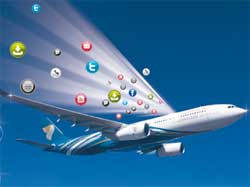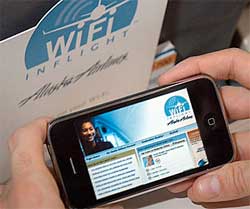WiFi in the sky set for takeoff

More airlines are rolling out new and improved services thanks to satellite technology, industry leaders said at the recent Singapore Airshow, with the public increasingly demanding wifi on planes.
US-based Honeywell Aerospace and Gogo, which supply inflight connectivity systems to airlines, are collaborating with satellite company Inmarsat to implement the "first global high-speed broadband for the skies" dubbed the Global Xpress (GX) Aviation network.
Briand Greer, president of Honeywell Aerospace Asia Pacific, said inflight WiFI could generate US$2.8bn for the company over the next 20 years.
He estimates that around seven to eight percent of airlines currently offer wireless connection, but says this number is expected to grow to 25% by 2018.
WiFi speeds improving
"After years of being bogged down by weak demand because of poor signal quality, inflight WiFI can now enable download speeds of up to 50MB per second," Greer said.
"How we describe it is it will be like you are sitting at Starbucks with your smartphone, your computer and your iPad," Greer told reporters.
Onboard WiFI not a new idea -- European carrier Lufthansa debuted Boeing's Conexxion system in 2004. But by 2006 the company announced its exit after the expected growth in the market did not materialise.

Recent surveys by Airbus and Honeywell, however, suggest that the market might now be ready as passengers increasingly expect airlines to have inflight wireless services.
Airbus published a report in February about the comfort demands of Asian passengers, carried out by global consultancy Future Laboratory. One of the future trends highlighted was that Asian business passengers would expect WiFI enabled cabins with telephone and conference calling facilities.
Honeywell also conducted a survey of 3,000 passengers from the United States, Britain and Singapore and nearly 90% would give up an amenity, such as drinks or a better seat, for a faster and more consistent wireless connection.
Satellite connections
When flying over land, planes use telecommunication towers to transmit Internet signals but during long-haul flights, when they fly over large expanses of water, consistent connectivity becomes a problem. In those cases, a satellite network is needed.
In December last year, Inmarsat launched the first of three satellites that will serve the GX network. Air China will be the first airline to test it, on its A330 fleet in the second quarter of 2015.

Singapore Airlines, which launched its US$50m inflight connectivity programme in September 2012, said it planned to finish equipping its aircraft with the hardware by 2015.
A Lufthansa spokesman said that it would also begin rolling out inflight WiFI on all of its planes from the middle of this year.
Thai budget airline Nok Air announced during the Singapore Airshow that it will equip its new Boeing 737 fleet with WiFI.
Peter Andersson, general manager of aviation navigation company Jeppesen said that the technology could benefit cockpit and airport operation.
"If you have something that you need to repair, you can get the status check to the ground level so they can be prepared and can actually do the maintenance more quickly," Andersson told AFP.
Sashangar Sreetharan, an analyst at McKinsey and Co. who flies twice a week, said that only airlines with WiFI were considered "preferred carriers" for his firm. But he admitted that although he often worked during flights, the wireless service quality has been sub-standard.
"The speed is quite slow and every now and then you lose signal, but it isn't too bad. However, once you are on a Virtual Private Network (VPN), the speed is so slow that gateway timeouts occur," Sreetharan told AFP.
Sreetharan said he was not sure everyone would necessarily want WiFI on planes.
"Honestly, if the WiFI was better I'd rather have it. I mean that is because my bosses are reasonable and don't push me while I'm flying," Sreetharan told AFP.
"But if they started harassing me on flights, I guess I would swap to not having it, I don't want to be emailing back and forth during a long flight," he added.
Source: AFP via I-Net Bridge
Source: I-Net Bridge

For more than two decades, I-Net Bridge has been one of South Africa’s preferred electronic providers of innovative solutions, data of the highest calibre, reliable platforms and excellent supporting systems. Our products include workstations, web applications and data feeds packaged with in-depth news and powerful analytical tools empowering clients to make meaningful decisions.
We pride ourselves on our wide variety of in-house skills, encompassing multiple platforms and applications. These skills enable us to not only function as a first class facility, but also design, implement and support all our client needs at a level that confirms I-Net Bridge a leader in its field.
Go to: http://www.inet.co.za







